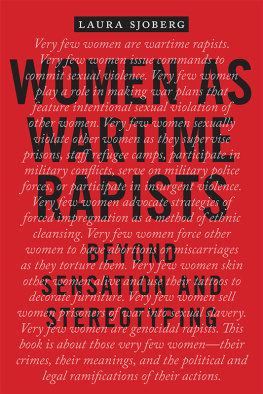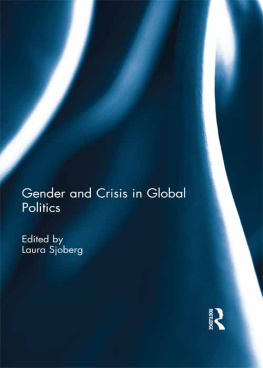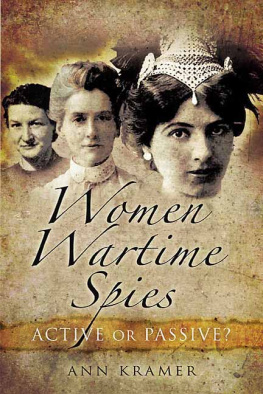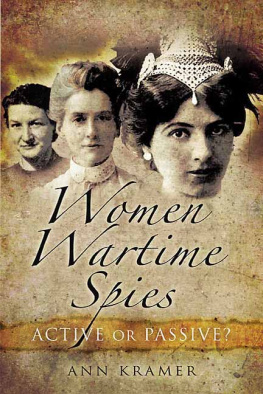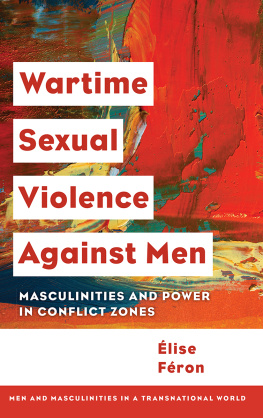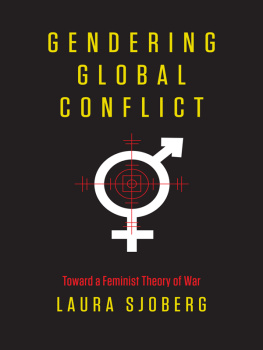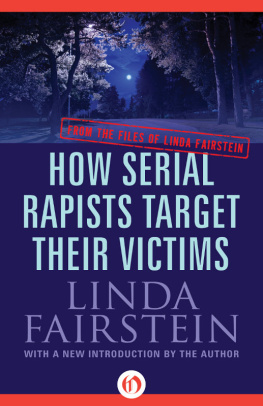Sjoberg - Women as Wartime Rapists
Here you can read online Sjoberg - Women as Wartime Rapists full text of the book (entire story) in english for free. Download pdf and epub, get meaning, cover and reviews about this ebook. publisher: NYU Press, genre: Romance novel. Description of the work, (preface) as well as reviews are available. Best literature library LitArk.com created for fans of good reading and offers a wide selection of genres:
Romance novel
Science fiction
Adventure
Detective
Science
History
Home and family
Prose
Art
Politics
Computer
Non-fiction
Religion
Business
Children
Humor
Choose a favorite category and find really read worthwhile books. Enjoy immersion in the world of imagination, feel the emotions of the characters or learn something new for yourself, make an fascinating discovery.
- Book:Women as Wartime Rapists
- Author:
- Publisher:NYU Press
- Genre:
- Rating:4 / 5
- Favourites:Add to favourites
- Your mark:
- 80
- 1
- 2
- 3
- 4
- 5
Women as Wartime Rapists: summary, description and annotation
We offer to read an annotation, description, summary or preface (depends on what the author of the book "Women as Wartime Rapists" wrote himself). If you haven't found the necessary information about the book — write in the comments, we will try to find it.
Women as Wartime Rapists — read online for free the complete book (whole text) full work
Below is the text of the book, divided by pages. System saving the place of the last page read, allows you to conveniently read the book "Women as Wartime Rapists" online for free, without having to search again every time where you left off. Put a bookmark, and you can go to the page where you finished reading at any time.
Font size:
Interval:
Bookmark:
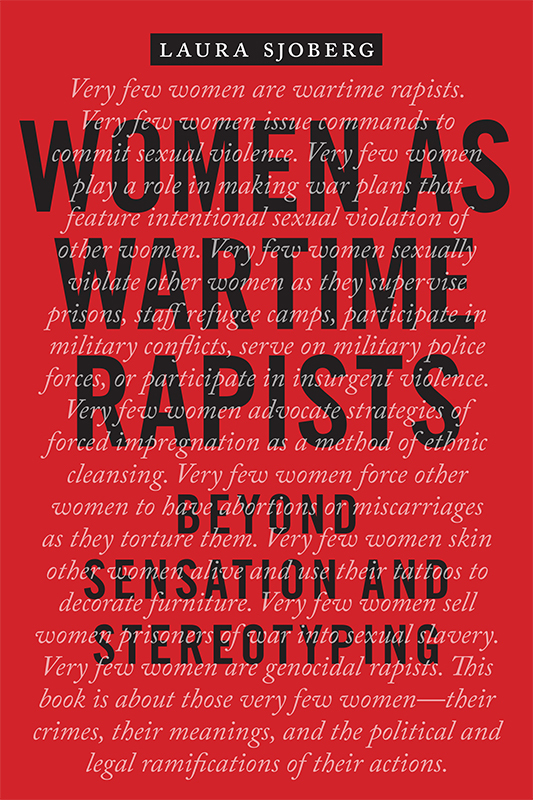
PERSPECTIVES ON POLITICAL VIOLENCE
General Editors: Laura Sjoberg and Cameron G. Thies
Women as Wartime Rapists: Beyond Sensation and Stereotyping
Laura Sjoberg
Laura Sjoberg

NEW YORK UNIVERSITY PRESS
New York
NEW YORK UNIVERSITY PRESS
New York
www.nyupress.org
2016 by New York University
All rights reserved
References to Internet websites (URLs) were accurate at the time of writing. Neither the author nor New York University Press is responsible for URLs that may have expired or changed since the manuscript was prepared.
ISBN : 978-0-8147-2927-4 (hardback)
ISBN : 978-0-8147-7140-2 (paperback)
ISBN : 978-0-8147-4493-2 (ebook)
For Library of Congress Cataloging-in-Publication data, please contact the Library of Congress.
New York University Press books are printed on acid-free paper, and their binding materials are chosen for strength and durability. We strive to use environmentally responsible suppliers and materials to the greatest extent possible in publishing our books.
For Caron Gentry
who makes this endeavor worth it to me
This book was an impulsive idea that took a long time to produce. In its production, I relied heavily on the institutional support of the University of Florida, including but not limited to a Humanities Scholarship Enhancement grant that helped me find the time and the resources to do its empirical research. I was lucky enough to have the opportunity to present parts of this book at the annual meetings of the American Political Science Association, the International Studies Association, the International Studies Association-Northeast, and the International Studies Association-West. These audiences, as well as audiences at invited talks at the United States Institute of Peace, Lancaster University, Virginia State University, and the University of Southern California, helped formulate the ideas in this book. Some of my thinking about gendered orders in global politics could not have been clarified without my co-participants in the Hierarchy workshop at the University of California, San Diego, in May 2014. Colleagues feedback on parts of and early drafts of this project helped to give it direction, empirically and theoretically.
In addition, a number of people have provided significant research support for this project. Ruchan Kaya did some of the early news research. Alex Deheleans thorough empirical work is reflected in a number of places throughout the final text. Michelle Ascunsions careful reading of the first draft of this book was helpful, and caught a number of errors. Ilene Kalish and Caelyn Cobb, my editors (for the book and for the series in which it has found its home), have been patient and supportive over the (way too many) years. More than a decade later, I still rely heavily on the sage advice and careful reading of my former dissertation advisor, Ann Tickner. This project was inspired by, and continues to be in dialogue with, my work with Caron Gentry. Carons correspondence, co-authorship, and friendship over the years has been not only an intellectual stimulus, but one of the most fulfilling parts of this career for me.
I am also grateful to a number of scholars who gave selflessly of their time in order to read parts of this bookLauren Wilcox, Jennifer Lobasz, Sandra McEvoy, Spike Peterson, Joyce Kaufmann, Kristen Williams, Cynthia Enloe, and Dara Kay Cohen. My studentsgraduate and undergraduatehelped me work through some of the more difficult theoretical issues in this book. Several of my graduate and undergraduate students helped at various points where I was stuck in the analysis of this book, including but not limited to Jon Whooley, Anna Weissman, Catherine Jean, and Christian Chessman. Rachel Feldman read and edited the first full draft of this book like a pro. On a flight between Amsterdam and Atlanta, then-University of Alabama student Christina Kozuh expanded my thinking about the books subject matter. Both of my parents actually read a full draft of this book cover to cover and provided feedbackI do not have words to express my gratitude for that. As I was reading the proofs of this book, I lost my father. I will always treasure his involvement with this book. One of the reviewers of the manuscript carefully marked up a full copy with suggestions and queries. It was amazing, and I am humbled and grateful.
Much of this book was written sitting next to (and with the support of) my Chihuahuas. Gizmo struggled with heart problems as I read and wrote heart-wrenching stories. Aprils refusal to get excited about anything was a steady contrast to my moodiness as I wrote. Maxs combined cuddliness and viciousness constantly reminded me that no story is as simple as it seems. Together, they make my work possible, peaceful, and enjoyable.
In most of the book acknowledgements I have written, I have told a story about how someone treating me or what I do poorly has inspired the work on a book project. There has certainly been a fair amount of that in the six years this book has been an idea and in progress. Still, as I finished revising it, it was the support of the people who believe in me and what I do that was most important to me. I am forever indebted to friends in the field and outside who care deeply, tolerate imperfection, and assume the best rather than the worst (or, preferably, do not assume at all).
Very few women are wartime rapists. Very few women issue commands to commit sexual violence. Very few women play a role in making war plans that feature intentional sexual violation of other women. Very few women sexually violate other women as they supervise prisons, staff refugee camps, participate in military conflicts, serve on military police forces, or participate in insurgent violence. Very few women advocate strategies of forced impregnation as a method of ethnic cleansing. Very few women force other women to have abortions or miscarriages as they torture them. Very few women skin other women alive and use their tattoos to decorate furniture. Very few women sell women prisoners of war into sexual slavery. Very few women are genocidal rapists. This book is about those very few womentheir crimes, their meanings, and the political and legal ramifications of their actions.
It is difficult to write a book about those very few women, though, given that they are frequently invisible, or, when visible, are often sensationalized. Take, for example, the Wikipedia entry on war rape.
I do not mean to hold Wikipedia up as an example of the most in-depth knowledge on the subject of who wartime and genocidal rapists are, or what wartime or genocidal rape is. Instead, I mean to point out that a general description often used for popular consumption editable by literally everyone which has many of the key details of the definition of, occurrence of, and history of wartime rape makes no mention of the existence or possibility of female perpetrators. This omission occurs in the great majority of newspaper articles, websites, human rights reports, policy briefs, and scholarly articles that address sexual violence in war and genocide.
Discussions of wartime sexual violence that do mention women perpetrators are few and far between, and many of them sensationalize those women. For example, Ilse Koch was married to Nazi commandant Karl Koch, who headed Buchenwald concentration camp during World War II. Ilse became a guard at Buchenwald. The available evidence suggests that Koch participated in acts of torture and terror in her time at Buchenwald. Compared to other women alleged to have committed wartime sexual violence, Ilse Kochs actions are mentioned in a relatively high number of histories and analyses. Tales of her most well-known transgressions recount her collecting the tattooed skin of women prisoners as home decorations, crafting lampshades and other household goods from the skin of Buchenwalds victims. Her involvement in the torture of female prisoners was part of the reason that she was sentenced to life imprisonment at the end of the war.
Next pageFont size:
Interval:
Bookmark:
Similar books «Women as Wartime Rapists»
Look at similar books to Women as Wartime Rapists. We have selected literature similar in name and meaning in the hope of providing readers with more options to find new, interesting, not yet read works.
Discussion, reviews of the book Women as Wartime Rapists and just readers' own opinions. Leave your comments, write what you think about the work, its meaning or the main characters. Specify what exactly you liked and what you didn't like, and why you think so.

